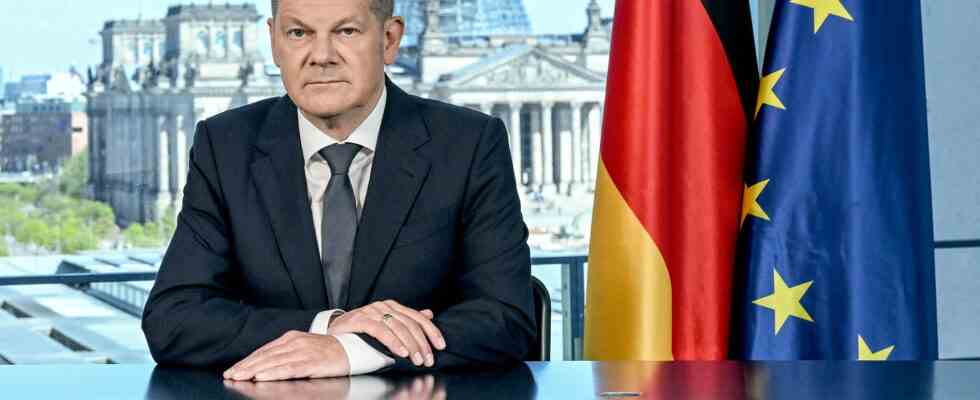analysis
As of: 05/08/2022 8:41 p.m
Scholz didn’t really say anything new in his television speech on May 8 about how to deal with the Ukraine war. And yet something was different: Instead of “wobbly” statements, the chancellor got to the point.
Recently, the new Prime Minister of Saarland, Anke Rehlinger, gave politicians good advice: speak in simple, clear German main clauses. She didn’t say who she’s giving this advice to, but it seems to have gotten across.
Olaf Scholz’s TV speech was finally what is constantly being asked of him: it was, so to speak, “free of fluff”. Lots of clear sentences and a clear structure. Just like you learn in rhetoric seminars. Even if in terms of expression and facial expressions, most pastors in the word for Sunday still come across as more exciting than the German chancellor.
Chancellor Scholz’s televised speech
5/8/2022 6:45 p.m
Stick to the basics
In terms of content, there wasn’t much that was new. Scholz has neither commented on travel plans to Ukraine nor on details of new arms deliveries. He stuck to the basics.
May 8th as the end of the Second World War in 1945 – and May 8th in a new war in Europe in 2022. Scholz then describes Germany’s role in the speech: Our historical responsibility towards both states – Russia and Ukraine. And the duty to stand with Ukraine now. Even with weapons.
Arms deliveries – a decision based on principles
Then Scholz takes up the current dispute over these weapons deliveries. He calls for this discussion, which he describes as “good and legitimate”, to be conducted with respect and mutual respect. “But we won’t do everything that one or the other is asking for,” he says.
This time he’s not talking about “boys and girls” who want something – but the conclusion that Scholz draws for himself is the same: he wants to think about it in peace and only feels obliged to his oath of office to avert damage from the people. From this he derives four principles, which he describes in the speech: no German solo efforts, improve German defense capabilities, do nothing that harms us more than Russia. And NATO must not become a party to the war.
Briefly and clearly out of the communication dilemma?
He’s said all of this before in one way or another. However, not so short, clear and structured. And that is certainly one of the main reasons for this short television speech. The Chancellery tried again with a new format. The other formats – press conferences, long interviews on radio, TV and magazines – have not really worked so far. The Chancellor sags in the polls. Scholz is in a communication dilemma.
First he didn’t say anything for too long, leading to headlines like “Where’s the chancellor?” provoked. Then he said a lot, but in such a way that hardly anyone understood. After a press conference in the Chancellery, the journalists asked each other what he might have meant.
Next followed many interviews with many endless sentences, which often neither provided answers to the questions nor were understandable. In Berlin there was an increasing discussion about whether he simply couldn’t do it or whether he deliberately didn’t want to be understood – and answers were refused with swear phrases. This in turn earned him the accusation of arrogance.
Example Habeck
Scholz wants to weigh up. This also means that he may have to change his mind in the course of events. It would all be understandable if he explained it well in public. The current master at this is Robert Habeck, the Vice-Chancellor. Nobody describes their stomach ache more authentically and thus more credibly when they have to throw political principles overboard because it is the only way to get the situation under control. No matter what format.
Scholz did quite well this time in the format of the television speech. As chancellor, however, he should have more communicative skills.

